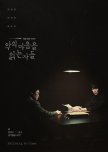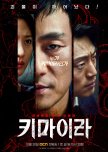
This review may contain spoilers
La suerte está echada
There are quite a few Spanish references in this drama, so it’s only fair that I pay homage to it by giving my review a Spanish title, which was referenced in the closing scenes of the final episode and translates as, “the die is cast”.Sinister Beings is a TVB police procedural that focuses on the HK law enforcement system, specifically the police - through the departments of Organised Crime and Triads Bureau (OCTB), Criminal Intelligence Bureau (CIB), and the Special Duties Unit (SDU) - and the justice system via its prosecutions division. It also features vicious terrorists, shadowy triads, corrupt tycoons and their conglomerates, genius computer hackers and the elusive dark web, high-flying unscrupulous barristers, greedy investment fund managers, deeply disturbing sociopaths as well as psychopaths, and plenty of beautiful seductive temptresses. In addition to police investigation, action and crime, this drama has plenty of romance (including love triangle), slice-of-life and showcases themes of friendship, brotherhood/ bromance, and certain scenes/ side stories of an “adult-oriented nature”. This drama really does have it all.
For regular TVB drama viewers or at least those who are familiar with their offerings, this isn’t groundbreaking content for the typically formulaic crime genre that has been done countless times. But, while many similar productions in the past are a hit-or-miss, for the most part this one has been quite well executed albeit not without flaws. The technical aspects are commendable while recycled plotlines feel somewhat refreshingly updated rather than dated.
For the uninitiated or newcomers to TVB productions, Sinister Beings would be great as your first HK drama. This is especially so if you’re a fan of the police investigation and crime genres.
What I Liked
The cast. The 2 male leads are veterans of the industry and their experience truly shows. Ruco Chan (Sun Sir) and Ben Wong (Nic Sir) elevates any production with their finesse and approach to interpreting characters. With the former, you know you’re in for action-packed sequences while the latter gives us nuanced portrayals. Both of them have their own little moments of bromance which were endearing to see. Rosina Lin (Wing) is much more understated here while Crystal Fung (Ana) is somewhat more vibrant as a Spanish-speaking South American-raised overseas Chinese. I particularly enjoyed Joman Chiang’s depiction of Hazel, the highly competent and professional lawyer. Jonathan Cheung (Marco) and Moon Lau (Rachel) put an interesting spin to their colourful characters. It was a pleasant surprise to see Michelle Yim and Chin Siu Ho in their guest roles, among many others who were involved.
The action. Blazing gun battles, unarmed combat sequences, and car chases are depicted throughout. The choreography, stunts and pyrotechnics are generally well-rendered.
The cases. In addition to the overarching mystery and main investigation of terrorist attacks, we have a number of other unrelated criminal cases written in. They include armed robberies, high-profile kidnappings, murder mysteries, gangland warfare, cultists, and arsonists, among others. A number of the cases are quite cleverly written and compelling, although a couple of them seem quite generic.
The romance. Not all of it but in particular the relationship between Nic Sir and Hazel. I had fun watching these two dance around each other, where I felt that their interactions were portrayed in a very mature and relatable manner. They even have their own “couple OST” in the form of Masha Ray’s Sweetheart, which brings along a certain quirkiness to their scenes at times.
The music. I’m quite enthralled by the mood-inducing tone of the ending theme, the slow-rock ballad Secret Garden by Hana Kuk. The original music score accompanies some of the more emotional scenes, instead of stock music. There are 3 tracks in general:
Adversity (逆襲) by Hubert Wu
Secret Garden (秘密花園) by Hana Kuk
Hasta La Vista by Masha Ray
What I Didn’t Really Like
The slice-of-life. Particularly aspects involving Wing’s mother and her obsession with her daughter’s wedding as well as meddling in her personal affairs. Most of her scenes are fillers which take up more screen time than was necessary.
The love triangle. This side story dragged too long towards an unsavoury conclusion. I honestly feel this prolonged and slightly melodramatic arc is redundant and overshadows the main story at the tail end of the drama.
The adult-themes. Scenes of seduction, cosplay and role-playing, sexual innuendos are becoming a norm for TVB dramas these days. It wasn’t always like this, while even C-dramas and K-dramas in general are not as explicit with such depictions. I know TVB is constantly attempting to reinvent and modernise its productions to attract viewers in sustaining drama ratings. This is made all too obvious with the inclusion of a great many scantily-clad voluptuous women in plotlines that incorporate gratuitous sexual behaviour and violence.
Overall
Sinister Beings is one of the few TVB dramas of late that I’ve found really enjoyable. It maintained the momentum of its pace and, as a result, sustained my interest over a large part of its run. But as is typical with its formulaic approach, the ending is always rushed to accommodate elements other than the main story. There are even rumours of a sequel, depending on the success of the drama. Because of the earlier-mentioned dislikes as well as the bittersweet nature of the closure, my overall enthusiasm was slightly tempered towards the end. What could have been an 8.8 ended up being a 7.8, which still represents good value for your consideration.
Was this review helpful to you?

Medical Justice
Doctor Lawyer is a suspenseful medical and legal thriller that merges the medical world of cardiothoracic surgery and courtroom atmospherics, against the backdrop of South Korean governmental and chaebol (conglomerate) politics. The screenplay leverages heavily on a revenge-justice narrative that features alternate approaches towards avenging perceived grievances and wrongdoings committed by multiple parties. Despite not being mentioned in the tags, there are certain elements of melodrama that lean towards the spectacular and somewhat amusing rather than the outright overdramatic and toxic angst. Expect an infusion of some romance and love triangle (primarily with supporting characters), a little bit of physical action but a whole lot of thrilling sequences particularly revolving around the surgical theatres and the courtroom proceedings.Directed by Lee Yong Seok (Haechi, The Village: Achiara's Secret) and Lee Dong Hyun, based on the original screenplay by Jang Hong Chul (Class of Lies), this MBC production is streamed internationally via Disney+. It tells the story of a brilliant thoracic surgeon who loses everything and everyone overnight as a result of powerful forces at play which leads to his reinvention as a defence attorney some 5 years later, hence the title of the drama, to seek vengeance.
This is So Ji Sub’s first drama project since his wedding in 2020, with My Secret Terrius being his last TV drama that aired 4 years prior. The soundtrack features 4 songs, with Chen’s evocative ballad and outro theme An Unfamiliar Day being my personal favourite. Full listing as follows:
Freedom by Lee Chang Seop (BTOB)
An Unfamiliar Day by Chen (EXO)
Fight On by Yoo Hoe-seung (N.Flying)
My Shadow by Leeraon
What I Liked
Fresh from completing Lee Joon Gi’s Again My Life, which ended right before Doctor Lawyer began, there are similarities to be drawn between the two productions. Both are revenge-justice driven legal dramas where the primary antagonist is played by the same actor, Lee Kyung Young, in a near-identical capacity with a pervading aura of invincibility and villainy. Where the two differ is that the latter is a much more compelling, suspenseful and multifaceted drama, in my humble opinion.
This drama is made much more compelling and serious without the presence of mis-placed humour or rigorous attempts at comic relief. The antagonists (inclusive of the primary, supporting and “hidden” ones) maintain several layers of grey throughout which augment the complexities of the characterisation and add depth to the overall schemes and machinations of the various plotlines that make up the overarching story. The main characters, particularly the ML himself, exude an immense likeability factor that’s based on a fleshed out backstory while the absence of any distracting or forced “romantic complications” all contribute to the brisk and eventful storytelling.
Speaking of the storytelling approach, there are hardly any slow or boring moments in the show which consistently delivers exciting cliffhangers in many episodes and surprising twists and reveals towards the business end. These aspects certainly keep things interesting and engaging for the viewers indeed. Although certain plot devices and developments are neither completely unforeseeable nor exceptionally innovative, there is certainly no denying the entertainment value therein. I would also add that at least the cliffhangers are not faked or sensationalised to induce contrived red herrings merely to spike interest (and annoy) viewers.
Aside from my enjoyment of revenge-themed stories, medical and legal dramas are amongst my favourite genres, especially the all-action fast paced variety. This drama has all of the above in equal measure and presented in a low-key edge-of-the-seat style that evokes a certain measure of excitement. The frantic dramatisation of the surgical procedures are particular highlights for me, which are aided by the quality production values that infuse no small amount of realism into these scenes. As a medical genre, this drama is right up there in terms of top notch delivery.
So Ji Sub is a huge pulling factor that attracts me to this drama, coupled with the fact that I had never seen one where the lead actor plays 2 distinctly contrasting professions i.e. a surgeon and a lawyer. As the ML Han Yi Han, So Ji Sub does a fantastic job of blending all the emotions of an aggrieved victim of circumstances and drawing strength from them to exact his plan for revenge, as well as the juxtaposition between a mild mannered, naive pushover and an assertive, confident man on a mission. His portrayal may not be the absolute best and, at times, does feel somewhat subdued but his experience and charisma ultimately provide an aura of respectability and touch of class to the role.
Shin Sung Rok is literally the wild card of the cast, playing the effervescent and slightly manic American-Korean investor with a murky past, Jayden Lee. Think of his character as a more toned down version of the Riddler or even Joker himself (from DC’s Batman). I suspect he had as much fun assuming this role as I had witnessing his controlled histrionics. His interpretation of the character gives the drama a raw edge that allows it to expand beyond the usual scope of revenge themes and injects a bit of fun into the proceedings as well.
My third time seeing Lee Kyung Young this year, after his appearances in Again My Life and Why Her. His portrayal here is reminiscent of his performance as Cho Tae Seob in AML but I do feel that his character of Goo Jin Ki is better written without being as overly superpowered and linear as the former. The antagonistic Goo Hyun Sung is depicted by Lee Dong Ha, another actor who was previously seen in a similarly villainous capacity this year in From Now On, Showtime! Some actors just fit the villain profile perfectly, as is the case with him, but again I do feel the characterisation here is less one-dimensional and has a more evolutionary trajectory to his character arc.
Of the ladies in the cast, Im Soo Hyang who plays the FL Geum Seok Young feels more a supporting role than a main character. That said, even with the diminished spotlight and initial annoyance of her character’s narrow minded stubbornness, she conveyed her emotions very well and shared a convincing professional working relationship with the ML without being hindered by romantic tensions being shoehorned into their dynamic, despite their past history together.
What Could’ve Been Better
As much as I appreciate a positive outcome with complete closure of all threads, I do wish for a slightly different trajectory particularly pertaining to the overarching arc. That said, it's more of a personal preference rather than a fatal flaw of the screenplay. The ending is still good but could've been given a bit more depth and satisfaction, in my opinion.
Lee Joo Bin who plays Im Yoo Na has an interesting side story that focuses on the “love triangle” between her and Jayden Lee as well as Goo Hyun Sung. I’m generally glad that the drama stays focused on the revenge-justice theme instead of being sidetracked but the interactions between this subset of characters are actually rather fun to watch. It could potentially have a spin-off of its own because each character possesses enough backstory to be fleshed out given the burden that they carry resulting from their turbulent past.
The few individual legal cases that are showcased, all of which tie in to the main plotline, actually come across as quite intriguing in their own right. More of those would have been very welcome especially to highlight the details of lesser known medical conditions and the associated malpractice that had exacerbated those circumstances. As a consequence, the legal battles perhaps are not afforded more attention that they truly deserve.
Final Thoughts
Doctor Lawyer is an engaging revenge-driven drama that provides sufficient entertainment value through multiple twists and turns to sustain the 16-episode length of the production. It isn’t groundbreaking content but the smartly-written screenplay that seamlessly blends medical intricacies with legal proficiencies as well as having So Ji Sub as the main lead is certainly worth checking out.
Was this review helpful to you?

When art and gamjatang go hand in hand
One is a cultured and idealistic museum curator of fine and modern arts, the other an unrefined but street-smart nouveau riche CEO of a gamjatang empire. What happens when these two meet? You get Dali and the Cocky Prince, and the rest is history. What initially appears as an absolute clash between principled altruism and avaricious pragmatism slowly but surely blossoms into one of the most oddly curious yet boldly amorous pairings in K-drama rom-coms.Helmed by the director of Healer and Angel’s Last Mission, Lee Jung Sub while the screenplay is written by Son Eun Hye and Park Se Eun, both of whom co-wrote A Witch’s Love. The Cheongsong Museum of Art featured in the drama is actually the main museum of The National Museum of Modern and Contemporary Art, Korea (MMCA). In addition, the initial setting of Amsterdam during the first two episodes actually belongs to various unique locations across South Korea, as pointed out and painstakingly researched by @Vya van Velaris (shoutout to my Dutch friend!). Choi In Hee (Unasked Family, Red Shoes) serves as composer for the production. I was somewhat surprised that this drama is based on an original script rather than an adaptation of a novel or webtoon because of the extensive world-building.
Dali and the Cocky Prince is a hit-or-miss kind of romcom which doesn’t work for everyone. You either love it or hate it, which is apparent from the rather polarised viewer responses here on MDL and even among my own circle of friends. Personally for me, I belong to the “enjoyed it” camp but the drama is certainly not without its flaws.
What I Generally Loved
The art premise. The focus isn’t so much on art pieces per se but rather on the process of running an art gallery. In the context of the show, it is depicted as part artistic appreciation and philanthropy initiative that are based on a somewhat haphazard and risky business model. This aspect is explored with a degree of realism despite the lighthearted nature of the storytelling.
The humour and the romance. For the most part, I’ve enjoyed the comedic elements that incorporate slight slapstick undertones but generously OTT portrayals, particularly by certain cast members. This aspect is perhaps the main deal breaker for most viewers on whether to continue or to drop. I like the balance of the humor and emotions, while the chemistry between the leads helps immensely in making their interactions as well as the romantic development more endearing.
The story about opposites attract is as old as time itself. Despite not being groundbreaking or innovative, it does incorporate a number of themes to keep things interesting. In addition to the romance and the art, we have a love triangle and family makjang that play out amidst the burgeoning gamjatang restaurant business and shady realpolitik of chaebols and politicians.
For a KBS drama, the production quality is quite decent. As far as the visuals are concerned, the post-production editing of visual arts into B-reels or filler shots as well as scene transitions of the main footage is very creative and beautifully executed. This presentation fits with the overall artistic vibes of the production. The costumes, especially the FL’s dresses, are fashionably unique albeit unconventional. This includes her 1920s’ Gatsby-inspired hair styling which I thought matches her somewhat peculiar sensibilities.
The main cast comprising the leads Park Gyu Young and Kim Min Jae as Kim Da Li and Jin Moo Hak respectively. It’s hard to envision other actors in these roles because those two have successfully made the characterizations very much their own. This is my third time seeing Park Gyu Young this year. I thought her performance was intriguing in Sweet Home but I wasn’t impressed with the character design in The Devil Judge. Here as the titular Dali, she showcases a distinctive persona where she manages to infuse the perfect amount of quirkiness that brings out the eccentricity of her character. Meanwhile, Kim Min Jae deserves credit for his immersion into the character of Jin Moo Hak. At first glance, he comes across as cold-hearted and lowbrow but his gradual transformation from the opportunistic businessman to a warm teddy bear filled with rainbows and sunshine is quite remarkable because beneath all that bravado, deep voice and tsundere facade, there is a heart of gold after all.
Over the years, I have seen Kwon Yool expertly portraying a variety of villains and it is no different here with his understated depiction of the devious antagonist, Jang Tae Jin who possesses an extremely unhealthy fixation with the FL. Woo Hee Jin is fun to watch as art curator and Da Li’s confidant, Song Sa Bong. Her banter (and ideological debates) with Jin Moo Hak are one of the comedic highlights of the show. Hwang Bo Ra is a chameleon - her versatility in portraying a multitude of supporting roles extends to her utterly ludicrous depiction of the resident comic relief, Yeo Mi Ri.
As usual, no drama would be complete without the infusion of compatible BGMs and OSTs to elevate the key moments and heighten the overall feels. There are a total of 10 tracks for this show, some of which are collaborative pieces. My personal favourite is Kim Ye-ji’s Moon Crater for the quieter contemplative moments, while the playful That’s Ordinary Love by Seoho reflects the more adorable scenes between the leads. Full listing as follows:
I Want You By My Side 내 옆에는 너만 있었으면 해 by Ham Yeon-ji 함연지
That's Ordinary Love by Seoho 서호
Go Straight by DinDin
It's Strange (With You) 이상하죠 by Ha Hyun-sang 하현상
사랑할 순 없는지 Can't You Love Me by Fromm 프롬
U Hoo Hoo by Klang 클랑
Moon Crater 달 크레이터 by Kim Ye-ji 김예지
Gift by CHAI
The Kiss 연인 (키스) by Hodge
One Day It Will Be by Ian Hug, Seo Ho 서호
In addition, various iterations of the aria L'amour est un oiseau rebelle (Habanera) from the French composer Georges Bizet's 1875 opéra comique Carmen feature prominently as part of the BGM.
Unexpected Takeaways
This drama surprised me in many ways, not necessarily negatively but they were completely unexpected. For a premise based upon the appreciation of fine arts, one would expect a certain level of refinement and sophistication in the characterization that complements the narrative. Not so. This drama utterly excels in manifesting the incredible depths of hitting rock bottom, as far as the FL is concerned, and the extraordinary levels of the cast’s vocal registers through impassioned yelling.
I don’t think I’ve ever seen a lead character in any drama repeatedly hitting the never-ending depths of despair as frequently as Kim Da Li. Some of it is caused by factors beyond her control but there is a fair amount that can be considered self-inflicted. As much as her character eventually develops as the plot unfolds, she will stumble many more times before she either gets rescued or picks herself up.
As for the intense shouting, NEARLY EVERYONE does it. It gets louder by the episode and at the end of it all, my ears are still ringing. I suppose it is part of the OTT portrayals and not necessarily for the comedy but also for the raw emotional outbursts which are aplenty. I honestly think there is more screaming in this drama than any dark crime thrillers that I have watched this year alone.
Final Thoughts
Not everyone will be enamored of Dali and the Cocky Prince. To be fair, it is one of those dramas that needs to be experienced first hand in order to make sense of whether or not to start it. I actually found entertainment value in its idiosyncrasies and witnessed a somewhat different side to the cast along the way. The story wrapped up neatly in a HEA ending at the end of the leads’ journey which perhaps makes this story a worthwhile and rather enjoyable viewing experience after all.
Was this review helpful to you?

Bon Appétit
Facing a political impasse with the fate of the entire nation hanging by a thread? Fear not, for the PM’s own French cuisine chef shall come save the day. Sounds hard to believe but, as the aphorism goes, a hungry man is an angry man. Nothing complements diplomacy like fine dining with exquisite gourmet dishes that have been prepared with a lot of heart and soul.That is the premise for Gu Ra Me! Minister President’s Cook, which revolves around the talented young chef Ichiki Kurumi, as she rises above discrimination to emerge from obscurity in becoming the Japanese PM’s official residence chef. She gradually discovers that her masterfully prepared dishes do more than merely satisfy the palate but also provide valuable life lessons to the politicians and dignitaries who are served.
The drama is based on the seinen manga and gourmet manga, Gu La Me Daisaisho no Ryori Nin that was serialised from 2006 to 2010. It was conceived by Mitsuru Nishimura, himself a culinary supervisor and a former official residence chef for the respective Japanese ambassadors’ residences in Brunei and Vietnam. He had also written the manga Nobunaga no Chef in 2011. The screenplay adaptation is co-written by Shinya Hishida and Junpei Yamaoka (Ao no SP: Gakko nai Keisatsu Shimada Ryuhei, Iryuu Sousa 4 & 5), while the directing duties are shared between Taketa Tsunehiro (dele, BG: Personal Bodyguard series), Masayuki Ochiai and Takashi Komatsu.
The theme song, Color Variations カラーバリエーション, is performed by the Japanese 4-member hip hop group, Ketsumeishi ケツメイシ. Kazuyuki Ishii (Avalanche, Tokyo MER) serves as the sound design consultant while the composer for the score is Harumi Fuuki. This TV Asahi and MMJ co-production was partly filmed at the Japan Prime Minister’s official workplace and residence in Tokyo, known as Sōri Daijin Kantei (総理大臣官邸).
What I Liked
This is a lighthearted dramedy that doesn’t take itself too seriously and sometimes appears a little over-the-top but for the most part, features elements of realism pertaining to the cooking techniques and dishes, as well as current political themes albeit in a somewhat satirical manner. I was captivated by two aspects of the premise - influencing diplomacy by way of cooking, and the underdog story of Ichiki Kurumi, the cooking prodigy and titular PM’s official residence chef.
The story unfolds in an episodic format where wide ranging issues of a socio-political, diplomatic as well as commercial nature are featured. I truly had fun watching how the problems in each episode are tackled and resolved during the customary luncheon with the PM through Ichiki Kurumi’s wit in crafting her menu and the backstory behind every dish that befits the occasion.
In addition, viewers get to observe the overarching rivalry between Ichiki Kurumi and the incumbent grand hall chef, Kiyosawa Haruki. Both will compete throughout the drama for the chance of presenting their own gastronomic creations to the PM’s guests. The “kitchen battles” between them as well as the variety of dishes that they serve are one of the major highlights of the drama for me.
From the technical perspective, I have no complaints with the kitchen scenes and food videography which feature some of the finer aesthetics of French cuisine, with a Japanese touch. The creativity of the dishes is remarkably extensive and quite impressive. The regal vibe of the dramatic score is rather fitting to the atmosphere and, on occasion, seamlessly contributes to the comedic timing. It’s worth mentioning that every episode begins with a brief historical trivia that serves as a prologue, which I found rather educational and interesting.
Ichiki Kurumi is played by the lively Gouriki Ayame, who captivates with her spunky persona and never-say-die attitude. In complete contrast to her more subdued role in Biblia Koshodō no Jiken Techō, I thought she injected much energy and enthusiasm to the role here. I had a lot of fun watching her interactions with chief rival, Kiyosawa Haruki, who is depicted by Takahashi Issei. A marvellous actor with dynamic range, it was my first time seeing him in an antagonistic capacity for which he provides a decent delivery in a more supporting role.
I was amused by Miyake Hiroki’s Tamura Tomokazu, the FL’s sidekick, who offers comedic relief in the drama. Kohinata Fumiyo plays the understated PM Atou Ichirou whose main role throughout is eating, apart from sharing certain words of wisdom during the luncheon. Takito Kenichi is equally lowkey where his character Koga Seiji draws more attention to his funky hair than his limited dialogue. Shinkawa Yua mesmerises as the beautiful news reporter, Tachibana Yuuko while Naito Risa showcases an intriguing Atou Riko in a rather odd Gothic Lolita costume. Yukimi Matsuo, Miss Universe Japan 2013, makes a cameo appearance in what is her first ever drama project.
What Had Room for Improvement
The overall storytelling feels very much superficial and doesn’t get fleshed out with as much depth as I would have liked. The pace moves too briskly at times, which is understandable given the format and time constraint of 40 minutes per episode. Likewise most of the supporting characters as well as the PM’s guests where viewers are only afforded glimpses into their characterization without the full awareness of the individual backstories and potential for further growth.
Final Thoughts
This is a feel-good, light and easy viewing where viewers are encouraged to suspend disbelief and simply go along for the ride. Beautifully served food by a charming chef along with certain amusing and heartwarming moments are in store over the course of only 8 episodes.
On a side note, look out for the cute outro montage of the various main cast dancing to the theme song. It’s not often that one gets to see Gouriki Ayame and Takahashi Issei performing interesting dance moves in a drama production!
Was this review helpful to you?

It’s a homerun!
That’s exactly what happened - this drama knocked it out of the park! I might be 2 years late but better late than never. Being a fan of Nam Goong Min while recently having developed an admiration for Park Eun Bin following her dazzling performance in The King’s Affection, and coupled with the immensely positive feedback, reviews as well as recommendations of how good this is, it’s a no-brainer. What better way to kick-start the new year than with a justifiably top-rated production.In baseball terminology, the “hot stove” refers to the Major League Baseball offseason, particularly the time around the Winter Meetings when free-agent signings and trades are most prevalent. Hence the title Hot Stove League and the premise of the story, which takes viewers along an absorbing odyssey of redemption and glory with an underachieving South Korean pro-league basement team, the Dreams. Central to the narrative is the newly appointed General Manager, Baek Seung Soo, who has no prior playing or management experience in baseball. Assisting him in this capacity is the fiercely loyal and dedicated Operations Manager, Lee Se Young.
Directed by Jung Dong Yoon, who later garnered even wider acclaim for helming It’s Okay to Not Be Okay a year later, and based on an original screenplay by Lee Shin Hwa in what has been his only drama credit so far. Park Se Jun serves as music director. Principal photography took place in Incheon and Hawaii (for the California segment). The home stadium of real life pro-baseball team SK Wyverns, Munhak Baseball Stadium was used as the Dreamers homeground. Hot Stove League won best drama at the 56th Baeksang Arts Awards while Nam Goong Min won the Daesang at the 28th SBS Drama Awards, among a host of accolades achieved by the production team and cast in 2020, particularly for the categories of direction and screenplay.
What I Loved
Truth be told, for me the initial 20 minutes or so of the first episode feels a little dry and less than captivating. It looks like the typical SBS TV production with the depiction of an ongoing baseball match that appears somewhat confusing, perhaps attributed to too many characters being introduced along with the sudden exposure to the technicalities of the game being played. HOWEVER, the story progressively builds and eventually gains enough momentum that by the second episode, I become completely and hopelessly hooked. Although not possessing extensive knowledge about baseball - the rules, technicalities, terminology and the context of the South Korean league- I do have a general awareness of the team management and business aspects of sports clubs in general, having followed many other international sports in competitive leagues. This definitely helps to reduce the initial culture shock and in enhancing my appreciation for the plot.
Hot Stove League is one of those rare dramas that is both character and plot driven. The plot isn’t merely about a team of underdogs “being saved”, in the mould of typical sports-related stories. There are countless details and sub-texts imbued in the storytelling that involve what happens behind the scenes of running a professional club or the wheel-and-deal nature of player trading. In addition to the sport itself is the business context that features numerous boardroom battles. The multifaceted power as well as team dynamics feature conflicts and rivalries in various forms - among players and the management team; between players, coaching staff and back-end operations staff; even among the owners themselves and finally between competing clubs. There is literally so much going on with a myriad of intriguingly complicated characters who demonstrate an abundance of unpredictability in their trajectory to the final outcome of the story. This drama certainly isn’t lacking in curve balls being pitched into the plotlines as well, pun intended.
The most important ingredient of the drama and the key factor that holds all these elements together is the ML himself. Everything revolves around him where he is the true catalyst that sparks the entire drama to life. From the nuanced characterisation to the inner workings of his shrewd and strategic thought process in reviving a failing franchise and attempts at resolving neverending crises, while struggling with personal turmoil from the demons of the past that continue to torment him. The elaborate storytelling is utterly fascinating and riveting!
Nam Goong Min. What a sublime and exceptional actor he is and his performance here is nothing short of a tour de force of what we have come to expect of him yet incredibly never ceases to amaze me. I’ve always enjoyed his captivating roles over the years but his portrayal of the Dreams General Manager, Baek Seung Soo shall no doubt leave an everlasting impression on me. His qualities have always been a bit of a trademark that only he can project - that languid style of speech, the mannerisms and body language, the conviction of the acting, the artistry in his extensive range. All the hallmarks are apparent even in his recent transformation for the spy drama, The Veil. This is an extremely hardworking, intense and extraordinarily talented actor. Despite the entire cast doing well in their respective roles, Hot Stove League wouldn’t be the same without NGM at the forefront.
Park Eun Bin is my second reason for watching this and she doesn’t disappoint. Although no one can take away the plaudits for NGM’s leading role, she holds her own quite well as a supporting character that very much contrasts her take on a crossdressing monarch in The King’s Affection. Energetic and inspired as the first female Operations Manager in the baseball industry, Lee Se Young. This is a remarkably versatile actress who convinces every time in varied portrayals and settings. Also deserving of mention is Oh Jung Se who appears again on my watch list after last year’s Jirisan. His role as club chairman Kwon Gyung Min is compelling indeed and his approach for tackling one of the more complex characters in the drama is one aspect that I truly enjoy, in addition to the rather tempestuous nature of his interactions with NGM’s Baek Seung Soo.
The drama features countless familiar faces littered throughout either in minor supporting roles or guest appearances. The more impactful presence comprise Jo Han Sun as Im Dong Gyu, Ha Do Gwon as Kang Du Gi, Yoon Sun Woo as Baek Young Soo, and Lee Yong Woo as Robert Gil. There is even time for a surprising cameo from Lee Je Hoon in the last episode.
The production quality is quite decent where the camerawork and editing for the baseball games sequences are well executed. Hawaii provided more than a few breathtaking vistas during the California scouting arc, particularly through the use of aerial cinematography for a sweeping shot of the countryside. The soundtrack features five tracks ranging from the upbeat intro theme to melancholic vibes.
Lee Won Suk 이원석 - Cue Sign 큐사인
Kevin Oh 케빈오 - Mind
Oliver 올리버 - As the Cold Wind Passes 찬바람이 스쳐가며
Kim Tae Hyun 김태현 - Another Day is Passing 하루가 저물어 간다
Savina and Drones 사비나앤드론즈 - DOWN
Final Thoughts
There is much to love about Hot Stove League. Regardless of what I would consider as minor flaws in production quality which could have been better executed, there is no detracting from what has been truly justified plaudits for this drama. Now that I’ve seen it in its entirety for myself, I absolutely concur with the majority of the mainly positive reviews. It may not be a masterpiece, but it certainly is very close to being one. What a great start to the year with a fantastic drama!
Was this review helpful to you?

This review may contain spoilers
The moon shines as the river flows
River Where the Moon Rises is an adaptation of the novel “Princess Pyeonggang” (평강공주) by Choi Sa Gyu (최사규), which is a romanticized interpretation of the love story between Princess Pyeonggang and On Dal, characters in a classic Goguryeo folktale entitled Pyeonggang and Ondal.The timeline is set during the late 6th century, in an era when the 3 ancient kingdoms of Goguryeo, Silla and Baekje were at war with one another, while facing the looming threat of invasion by the neighbouring Northern Zhou of ancient China’s Northern Dynasties. Certain historical events as recorded in the Samguk Sagi (History of the Three Kingdoms) are incorporated into the overall setting. It is directed by Yoon Sang Ho who has extensive experience in sageuk notably with King Maker: The Change of Destiny, Saimdang Light’s Diary and his first Goguryeo drama, The Legend.
Initially beset by controversy due to a scandal involving its lead actor, Kim Ji Soo, the production team reacted swiftly by replacing him with Na In Woo from episode 7 onwards, although about 80% of the production had reportedly been completed. Fortunately the drama continued with only a brief delay in its airing schedule and the producers even decided to re-shoot the earlier episodes with Na In Woo in order to preserve the continuity of the story flow as well as for marketing and distribution purposes.
RWTMR is a dramatic sageuk that features decent production values, an engrossing plot, impressive cinematography and art direction. Through usage of cinematic colour grading, the scenery shots are absolutely breathtaking. The equally outstanding set designs provide an authentic depiction of the Goguryeo era, which appear markedly different from the usual Joseon settings. The characters are compellingly portrayed for the most part and, although by no means a sweeping epic, the finale itself certainly is, in every sense of the word. This engaging sageuk is presented in 20 episodes and headlined by a talented young cast.
The drama takes its time to meticulously chronicle how Pyeonggang and On Dal fall in love with each other and grow together to become the power couple of Goguryeo. It thoroughly explores the themes of family, friendship, loyalty, betrayal, revenge and love. There is no shortage of action, adventure, court intrigue and melodrama. The politics and schemes are not overly complicated or convoluted, while the action involves a combination of large-scale battles between opposing armies as well as concentrated sword fights and individual duels. The swordplay choreography is somewhat lacking (this isn’t up to the standard of Six Flying Dragons) but the battle scenes do not disappoint.
The pacing of the storytelling is somewhat uneven, particularly at the midway point where certain plotlines play out longer than necessary. Most notably the love triangle involving Pyeonggang, On Dal and Go Geon. The story arc concerning On Dal’s foster mother as well as the Sonno tribe village scenes prolonged a fair bit. The infusion of light-hearted comedic moments feel forced and out of place at times, especially involving the interactions between the characters of Sa Poong Gae, Tara Jin, Tara San, and the child Wol Yi. The drama does conclude in an extremely thrilling fashion where the final 4 episodes in particular are inundated with numerous action sequences and the closure of several story arcs.
The development of certain characters appear inconsistent where they are shown to behave irrationally and even out-of-character towards the end. I’m unsure whether this is due to the source material or the script. This applies to Pyeonggang, Go Geon and Hae Mo Yong. The angst of the “mini-separation” between the leads culminating in a 4-year time jump feels quite redundant. The said time jump also resulted in an explicable shift in the Crown Prince’s characterization. Pyeongang’s growth trajectory from amnesiac assassin to seasoned politician within such a short period (within a year or less) isn’t realistic. The military coup and replacement of the Crown Prince or even the King himself supposedly initiated by the Gyeru Tribe takes unbelievably long to transpire until it’s all too late. But the biggest issue I have is of the “events” that take place in the last episode - it’s difficult not to be disappointed with certain aspects of the writing.
As far as the acting is concerned, personally it took a while to warm up to both Kim So Hyun and Na In Woo in their respective roles of Pyeonggang and On Dal. In particular In Woo who was immediately parachuted in as replacement in episode 7. However, they both steadily grew into their roles and have been rewarded with a Baeksang nomination each, for Best Actress and Best New Actor.
I do feel that perhaps Kim So Hyun lacks a little bit of the nuance and gravitas in her portrayal, especially during the second half when the final phase of the storytelling transitioned to the palace. She tries hard but she’s only 21 and lacks the experience and conviction of the other Baeksang Best Actress nominees that she’s competing against. On the contrary, I think Na In Woo’s characterization seems rather more seamless as he embodies the innocence and simplicity of On Dal’s character perfectly. I’m extremely surprised and impressed with his portrayal. His presence in this production is a blessing in disguise indeed, for he elevates the entire show with his superb performance. What is also beyond doubt is the chemistry between these two characters, which makes the romance aspect convincing.
Lee Ji Hoon and Choi Yoo Hwa both deliver a very commendable portrayal of Go Geon and Hae Mo Yong respectively. Lee Ji Hoon’s performance, in particular, is worthy of much praise. As the secondary couple of the drama, the steady progression of their emotional connection to each other is compellingly depicted. These two characters very much mirror each other, through their shared hopelessness of being duty-bound to the expectations that are thrust upon them. Oftentimes I just wished that they could ride off into the sunset together and leave all their troubles behind.
The main villain is expertly portrayed by veteran actor Lee Hae Young as the nefarious and conniving Go Won Pyo. I honestly believe he would have made a more competent King than the incumbent, the blundering King Pyeong Won (as written and depicted in the drama). Special mention goes to the charismatic Kang Ha Neul, who guest stars as On Hyub. Despite his limited screen presence, he absolutely lights up the screen whenever he does appear. There’s a reason this man won Best Actor at the 56th Baeksang - the quality of his portrayal is flawless. Kim Seung Soo deserves acknowledgement for his guest role of Silla’s King Jin Heung.
The musical aspect is perfectly executed, with a well arranged original score and a number of beautifully written evocative songs.
I become love to you by ZIA
Tears Of The Moon by Kang Tae Kwan
Against The Wind by Ahn Ye Eun
This is my way by Na Yoon Kwon
You are my destiny by Lily Lily
On the whole, RWTMR is a visually sumptuous period piece that presents a poignant depiction of heartwarming yet bittersweet romance, amidst the politics and tragic outcomes of the chaotic era. Despite the inconsistencies in the script and character design, as well as my disappointment with aspects of the ending, this drama remains engaging for the most part with sufficient thrilling twists and turns to keep things interesting. There is enjoyment to be found as long as expectations are properly managed.
Was this review helpful to you?

You’re being watched
Red Eyes: Kanshi Sousa-han is a 10-episode police procedural series about a newly-assembled team of dedicated crime fighters utilising means of technology to prevent criminal acts and apprehend the perpetrators (not necessarily in that order). This isn't groundbreaking state-of-the-art technology on show here but one of the many aspects of police procedural systems that perhaps do not often get the in-depth showcase in dramaland.In addition to western tv shows like Person of Interest and 911, this drama draws many parallels with K-drama, Voice. Red Eye’s Kanagawa Prefectural Police’s Investigation Support Analysis Centre and Voice’s Golden Time Team operate on the same basis of receiving “distress calls” and acting on them by dispatching a unit of field operatives while being ably supported by their teammates back at the control centre. Both teams are led by women and each of the respective field team leaders is a flawed anti-hero shouldering the burden of a tragic past - the loss of a loved one. Each case that is solved eventually connects to an overarching plot and culminates in the big reveal at the end of it all.
The main difference between the two - Voice relies on audio sensory while Red Eyes, as the name suggests, depends solely on visuals. Instead of a call centre that directly interacts with victims of crime, a huge metropolitan network of CCTVs is used to track down those criminal acts. Societal outcasts and ex-criminals (or more appropriately, good people who were somehow mixed up in bad circumstances and, as a result, have fallen from grace) are recruited to join this team. The mysterious (super)villain here is a lot more sinister and calculated with a nefarious scheme for bringing down the team.
This drama is quite engaging, for the most part. I like the concept of copycat criminals being based on infamous US serial killers being the underlying theme. The plot does make sense, albeit incredulously convoluted. The cast did a commendable job, being headlined by Kame who is fantastic in the lead role of the angst-ridden and tormented Kyosuke. Matsushita Nao’s portrayal of the team’s commanding officer Shimabara Yuri is equally convincing. My favourite side character is Minatogawa Yumiko, amazingly portrayed by Shishido Kavka, whom I thought is pretty cool and badass in her quiet and understated way. Each member of the team, including the villain(s) receives adequate screen time for developing their own story arcs.
The action is decent, comprising some slickly-choreographed unarmed combat sequences and pyrotechnics. The pacing is quite even with minimal fillers and sufficient nail-biting thrills in each episode. I appreciate the simple title cards depicting meaningful quotes at the end of each episode. The ending is a little unexpected, and although I have mixed feelings about the final outcome of the story, at least there’s definite closure for all the loose ends.
The main grievance I have is on the average production values, which in fairness isn’t really the fault of the crew. It’s great for a tv show but I can’t help but feel with a slightly higher budget, the production could have been even more impressive, at least from the stylistic and visual aspects. Despite being a 2020 production, the set designs and the lack of colour grading or more dramatic colour palette do make the show appear somewhat dated.
That being said, I’m quite satisfied with how the drama unfolded. Whether you’re a fan of Kame, police dramas or both, Red Eyes: Kanshi Sousa-han is well worth your time to check out.
Was this review helpful to you?

Home Sweet Home
Studio Dragon’s Sweet Home is the live-action adaptation of Naver’s eponymous webtoon. Based on many viewers’ feedback, it seems that both the original source material and drama are equally fantastic yet slightly different as well. I haven’t read the webtoon but having watched the drama, I would have to agree – it certainly doesn’t disappoint. Along with Alice in Borderland, also distributed by Netflix, Sweet Home became the most talked about show for a period of time in December 2020 not only here at MDL but also globally – it currently ranks in the top 5 in the US and number 1 in 13 other countries, according to statistics. And for good reasons too, apart from being accessible on a major international streaming platform.As it turned out, what I initially thought was a horror drama that was purely about monsters with thrilling action and suspense actually had a lot more going. What the trailers, vivid posters and edgy soundtrack compilation didn’t reveal was that Sweet Home was also a story about humanity, and the baggage of people issues that come along with it. I finally understood why 10 episodes (not including the potential sequel) were needed for this show.
This is a very well-crafted adaptation with an experienced cast of many familiar faces, stellar production crew, big budget CGIs, and outstanding cinematography, art direction, action choreography as well as excellent screenplay filled with well-written and colourful characters brought to life by superb all-round acting. It is directed by Lee Eung Bok, who helmed Mr Sunshine, Goblin, and Descendants of the Sun being the notable ones. The music score is composed by Gaemi, whose works include Mystic Pop-Up Bar, The King: Eternal Monarch, The World of the Married, and DotS, among many others. The visual effects are provided by Legacy Effects, VFX Studio Westworld and Spectral Motion, all of which worked on well-known productions such Avengers (Marvel Cinematic Films), Avatar, Game of Thrones and Stranger Things.
As for the main cast, there’s Lee Jin Wook (Voice 2 and 3), Lee Shi Young, Lee Do Hyun, and Park Gyu Young among the more well-known. The supporting cast comprises veterans such as the more familiar ones like Kim Nam Hee, Kim Gab Soo, Kim Sang Ho, Woo Hyun, and Park Sung Geun. The main character is played by the talented youngster, Song Kang in his second lead role.
In summary, the drama tells the story of how a group of inhabitants of an apartment building, Green Home (interestingly the apartment complex itself had a greenish tint), survive a monster apocalypse. How the monsters came about, let’s just say it’s not a natural evolution although some viewers may probably debate this. We see the best and worst of humanity in each and every single character of the show as they struggle to survive this disaster. In many respects, the characters likely mirror real life people that we meet in our day to day lives, for no monster is truly as horrifying as people themselves once they succumb to their inner darkness. At least, that’s my takeaway from this show. Each character has his or her own respective backstory, whose present lives are shaped by varying levels of tragedy and trauma of their past, which now intersect as they are forced to team up and face the onslaught of monster attack.
As far as character portrayals go, my personal favourites are Lee Jin Wook’s Pyeon Sang Wook, Park Gyu Young’s Yoon Ji Su, Go Min Si’s Lee Eun Yoo, and Kim Nam Hee’s Jung Jae Heon. For the supporting cast, Kim Sang Ho’s Mr Han, Woo Hyun and Kim Hyun as the shopkeeper and his wife respectively, were equally phenomenal. The characterisations adapted for the screenplay are immensely elevated by the excellent acting of these actors in particular. The depth and richness of each respective character arc and development, the deft execution and quality delivery of myriad emotional expressions, these were my major personal highlights from the drama.
As well-made and well-acted as this production is, where most of the cast brought their A-game and the special effects were truly exceptional, to me it wasn’t as close to flawlessness as it might have seemed to many viewers. I certainly enjoyed it but not as much as I had anticipated or hoped, possibly due to the immense hype that snowballed from prior to its official release up to the point of completion of airing.
The storytelling would have probably worked better with a shorter season of perhaps 8 or so episodes, (case in point, both seasons of Kingdom which had 6 episodes each) with a more compelling plot, sustained momentum and intensity by balancing the dramatic, thrilling and poignant moments. As it is, particularly from the mid-section to nearing the end with the sudden introduction of new characters, the additional build up felt dragged. It’s a case of each character being “fleshed out over excessively”. The pain, sorrow, fears and insecurities kept being reinforced incessantly throughout to the point of being rendered mere iterations, when discerning viewers have already utterly understood the message and underlying tone of human drama and tragedy being conveyed. Confrontations between characters and internal conflicts were magnified for maximum effect much longer than was necessary while the finale, when it eventually transpired and as thrilling as it was, wasn’t as satisfying or “epic” as it could’ve been to bring closure to this first season and more importantly, entice us viewers or at least me to higher levels of excitement in anticipating the follow-up season.
Regardless of the issues I personally felt, on the whole Sweet Home still remains a top tier production and a “viewing event” that’s very much worth a watch (and re-watch) and to a certain extent warrants the hype that accompanies it. It still could have been so much more and there remains vast potential to this series, so hopefully the second season would be even greater.
Was this review helpful to you?

Transcending Darkness
“Battle not with monsters, lest ye become a monster, and if you gaze into the abyss, the abyss gazes also into you.”~ Friedrich Nietzsche
Through the Darkness is a South Korean crime noir, detective investigation and psychological thriller which ranks amongst the best in the genre. The production is perhaps the most authentic in terms of story content, execution and depiction that I have seen in a K-drama. This is due primarily to the fact that it is based on the 2018 non-fiction book that deals extensively on the subject matter, Those Who Read the Minds of Evil.
Co-written by South Korea’s first criminal profiler Kwon Il Yong and journalist-turned-author Ko Na Mu, the true crimes detailed in the book provide the basis for the events depicted, bringing to life the notoriety of real-life serial killers that terrorised South Korea in the early 2000s. The serial killers presumably dramatised as fictional characters in the drama include Choi In Gu (child kidnapper and murderer), Kim Hae Sun (the Gochang serial killer), Yoo Young Chul (the infamous Raincoat Killer), Jeong Nam Gyu (the Seoul serial killer), and Kang Ho Sun (the luxury sedan serial rapist and murderer).
Spanning over a decade from 1998 through 2007 and revolving around Seoul Metropolitan Police Agency Criminal Behaviour Analysis Team Officer, Inspector Song Ha Young, the narrative focuses on five major aspects of his role as a criminal profiler:
1. The backstory that shapes his calling as a police detective, in which he first encounters a dead body as a child in 1975 and the subsequent discovery of his “empathetic traits”, which are manifested throughout.
2. The establishment of the Behaviour Analysis Team (BAT) as pioneers of criminal profiling in South Korea that results in the initial prejudice and ignorance that the team encounters in the police force.
3. The interviews with incarcerated serial killers in a bid to gain further insights into their state of mind and understanding of their modus operandi.
4. Leading the investigations and manhunt for the elusive serial killers, including interrogations of suspected perpetrators.
5. The evolution of the BAT’s perceived functionality and effectiveness within the police force, culminating in the coming of a full circle where Song Ha Young’s methodology of criminal profiling is finally acknowledged by his peers.
Directed by Park Bo Ram in what is his first show as production director (PD) where previously he was the assistant director for The Fiery Priest and Avengers Social Club. This is the first screenplay ever written by Seol Yi Na while the production design comes courtesy of art director Noh Sang Soon. The prolific Kang Dong Yoon aka Gaemi serves as composer. Kwon Il Yong was consulted as an advisor during filming.
The character of Song Ha Young reportedly drew inspiration from Kwon Il Yong himself, while Kook Young Soo is based on Yoon Oe Chul, the current head of the Gyeongnam Police Agency's investigation department, who created the first criminal behaviour analysis team in South Korea.
What I Generally Liked
The multifaceted character-driven story that not only encompasses the various phases of development of the BAT and the chase for the infamous serial killers, but also the insights gleaned through the in-depth study of these utterly evil and twisted minds, from the perspective of Inspector Song Ha Young. At times depicted in the style of a docudrama biopic, Through the Darkness is very much reminiscent of the Netflix production, Mindhunter. In fact, both productions share a very similar DNA, in terms of the non-fiction source materials and the inception of the criminal profiling standard.
Where they both differ is in the tone of the storytelling - the K-drama is much more visceral and gritty, especially during some of the most intense interrogation scenes ever seen, with little to no focus on any form of levity. In addition to the perpetrators and the crimes committed, the drama shines the spotlight on the victims and the suffering endured by their families that provides profound emotional depth to the overarching storyline.
The characterization of Song Ha Young is one of the most fascinating yet unusual in this genre. This character comes across as extremely pleasant, affable, and compassionate, none of which are traits typical of a South Korean police detective in the 1990s that we’ve ever come across in K-dramas, much less appear as such.
He’s a very nice guy who happens to be way ahead of his time and unfortunately finds himself surrounded mostly by old-school neanderthals in the police department. But it is this quality that endears him to most viewers and also adds conviction to how a profiler should be; broad-minded, erudite, perceptive, sensible, professional and rational. There is ample room for growth which is beautifully imbued into his trajectory as he demonstrates all the suppressed human emotions while struggling to contain the abyss that had consumed him for far too long in his role as a criminal profiler.
As far as the technical execution is concerned, I have nothing but praises for the production qualities in showcasing the art direction and designs of the era, the stylistic visuals befitting of a crime noir, and the music score that heightens the intensity and suspense, in addition to creating the perfect atmospherics for the emotive moments. The songs composed for this drama are contemplative and equally exceptional in expressing the emotions experienced by the major characters throughout:
Lullaby by Nerd Collection
Can't Run Away by Isaac Hong
A Flower That Blooms Alone by Kim So Yeon
Leopard of Mt. Kilimanjaro by 4Men
In terms of the cast performances, there are a number that catches the eye. None more so than the lead actor himself, Kim Nam Gil. This man never ceases to amaze for he possesses the ability to convincingly portray a multitude of characterizations to perfection over the years and his performance here as Inspector Song Ha Young is no different. Without him, this drama wouldn’t have worked as well as it has. The understated subtlety through his articulation of the role to convey the necessary nuances that connects viewers ever so intimately to Song Ha Young’s personal struggles and emotional state as he battles not only evil on the loose but his inner demons as well. Kim Nam Gil is deserving of at least a nomination, if not an award, for this year’s Baeksang in recognition of his efforts in this drama.
The supporting cast is generally quite decent which manages to sustain the overall acting quality of the drama. Special mention goes to Jin Seon Kyu for his lively depiction of BAT chief Kook Young Soo. The friendship that he shares with Song Ha Young is quite heartwarming to observe where they both collaborate as a sort of dynamic duo. Kim So Jin as the level-headed Captain Yoon Tae Go is one of the better written and portrayed female characters that I've seen. I was also most impressed with Kim Jung Hee who portrays the serial killer Nam Ki Tae. His remarkable portrayal, from the appearance to the mannerism, is downright chilling to the core. Amongst all the serial killers shown, his version is the most compelling and disturbing.
Final Thoughts
Although I haven’t read the source material, the fact that Kwon Il Yong, co-author and the original criminal profiler, gave his seal of approval for this drama provides credibility to the narrative and depiction of key events. Perhaps the manner of the storytelling might seem slow-burn but such is the nature of criminal profiling that it is heavily reliant on much needed patience to collate the necessary data leading to an accurate inference that ultimately determines the profile of the killer.
Was this review helpful to you?

Unsung Heroes
Decoded tells the story of a Mathematics genius, who has a form of autism, being part of a team of young recruits joining a confidential decoding unit of the Communist military, during their war against the Nationalists (Kuomintang) at the beginning of the Mao administration. Based on the novel of the same name by bestselling spy novelist, Mai Jia, the drama chronicles his journey from humble beginnings as a college student to becoming a hero of Unit 701 by successfully decoding the hitherto invincible Purple Code, an encryption program used by the enemy.The premise is reminiscent of The Imitation Game and A Beautiful Mind, while the storyline resembles Young Blood (2019). Action, thriller, suspense, and romance infused with slice-of-life and humour along with themes of coming-of-age, family, brotherhood, friendship, betrayal, tragedy, revenge, as well as redemption. This drama has it all neatly condensed into 41 episodes.
The drama showcases high production values in recreating the setting for Ningzhou in the late 1940s, in addition to the impressive art direction and authentic costume designs of the era. It features commendable performances by Chen Xue Dong and Ying Er in the lead roles of Rong Jin Zhen and Zhai Li respectively. They are supported by the talented Zhang Zhe Han and Jing Chao, along with notable veterans Guo Jing Fei and Bai Qing Lin. Li Nan delivers a compelling portrayal of the villainous Chen Jian Nian while Wu Wen Jing makes a memorable appearance in a guest role.
The plotline and characters are generally well written, although certain aspects of the storytelling defy belief somewhat through rather surprising turns of events and shocking twists and turns. A couple of story arcs are presented longer than necessary, thus resulting in uneven pacing especially at the halfway point. However, all major characters are fully fleshed out while the drama does finish strongly, albeit a little rushed particularly in the last episode that brings closure to the overarching plot.
Renowned composer Roc Chen (阿鲲) provides the hauntingly evocative theme song for the production, Wei Man (微芒) which is beautifully performed by Cao Yang (曹洋).
Overall, Decoded is quite an engaging and well-acted drama that provides enough thrills and spills from the decently-rendered action sequences and depiction of spycraft, as well as more than a few emotive moments throughout. I find myself quite invested in Chen Xue Dong’s portrayal of Rong Jin Zhen in his journey of self discovery where he experiences much character development that results in a truly remarkable transformation.
Was this review helpful to you?

“I will stay by your side until the end of my mission” - Akira Shimazaki
BG Personal Bodyguard tells the story of Akira Shimazaki and his team in the newly set up bodyguard division of Hinode Security Services, as they carry out their duties for a wide range of clients. Amidst the many diversely unique circumstances his dangerous assignments entail, Akira has to shoulder the heavy burden of his troubled past and navigate the travails of being a single parent whilst dealing with a simmering underlying romantic tension as well as an enveloping feud with the Metropolitan Police Department’s own officially sanctioned bodyguard section, the Security Bureau division.This is a brilliant show that has everything viewers could possibly hope for in a TV programme format and exemplifies nearly every aspect of drama production done well and beyond.
Headlined by the much-loved Takuya Kimura in the leading role, no superlatives are ever enough in describing the fine professional that he is, and for this role he has once again fulfilled the gold standard that we have come to expect of him. The character of Akira Shimazaki is one that demands such high levels of multi-layered complexity that only Kimutaku could accomplish through his nuanced performance. Even the physical exertions demanded to make this portrayal believable is delivered with aplomb.
Credit must also go to the excellent writing behind this production, which is provided by the hugely experienced screenwriter Inoue Yumiko. The key characters and their relationship dynamics, creative bodyguard assignments, compelling dialogue, clever overarching plot, the twists and turns are all deftly conceived and interwoven to produce this distinctive drama. Having written numerous highly-rated shows for more than 25 years, this drama is the first based on her screenplay that I have watched. I shall definitely make sure to savour more from her portfolio of works after this.
The overall production is top notch and exudes a simplistic brilliance where the pacing of the story progression from the episodic arcs to the main plot neatly accommodates ample character development before finally concluding in a thrilling climax. Decent performances by the supporting cast, in particular Eguchi Yosuke’s version of the antagonistic Ochiai Yoshiaki, Saitoh Takumi’s cold and detached Takanashi Masaya, and Ishida Yuriko’s intriguingly complicated Minister of Health, Tachihara Aiko. Special mention goes to the award-winning Kamikawa Takaya, whose understated portrayal of Murata Goro is both emotional and poignant.
Personally for me, BG Personal Bodyguard is not just an awesome drama with a solid story and all-round performances. I have watched a lot of bodyguard movies starring the likes of Kevin Costner, Clint Eastwood, Denzel Washington, Michael Douglas, and Gerard Butler. But Kimutaku’s version showcases a different side to the profession, a more realistic and humane perspective without the gratuitous violence of a gung-ho one-man show. It’s a roller coaster of emotions that conveys the meaning of friendship, teamwork, accountability, and loyalty in service of protecting others.
Was this review helpful to you?

Welcome to the freak show!
From Now On, Showtime! is a tale of urban fantasy with traditional shamanistic undertones, slapstick comedy, romantic themes and a touch of sageuk fiction. Some might even consider this primarily a rom-com but personally I feel it’s more comedic with elements of an overarching mystery, some action with a side of romance between multiple couples and a love triangle that develops in the later half of the show.The drama explores the mysterious origins of magician Cha Cha Woong and his “supernatural stage assistants”, whilst delving into his burgeoning relationship with beat cop Go Seul Hae as they team up to unravel unsolvable crimes.
Initially thinking that the inspiration for the story is drawn from a webtoon, this drama is actually based on the original screenplay written by Ha Yoon Ah who wrote the adaptation for Mystic Pop-Up Bar. Helmed by director Lee Hyung Min (Strong Woman Do Bong Soon, My Dangerous Wife and the hugely popular Winter Sonata) while Jeong Ye Kyung serves as music director of a drama for the first time, having previously been involved in feature films.
A total of 7 songs are listed as part of the official soundtrack, as follows:
Freak Show - Jeon So-yeon
I'll Be There - Andaun
Time - Paulkyte
Eheradiya - Bae Giseong
Fallin - Kim Hee-jae
You You You - Floody
Dandelion Seed - Zitten
What I Liked
This is a wild ride that’s filled with outrageous humour, larger-than-life characters and an unbelievably convoluted yet absurd storyline that spans two lifetimes with approximately 2000 years between them. Showtime! is the kind of show where logic is absolutely not a prerequisite for watching and viewers are best advised to leave their brain cells at the door before embarking on this rather insane adventure.
Park Hae Jin as the magician Cha Cha Woong and the shaman Poong Baek in the earlier lifetime. I’ve always been a fan of his deadpan style of acting and despite delivering the usual, he injects some range here with his depiction of two vastly contrasting characters as well as blending a mixture of adorable quirkiness and endearing charm as part of his eventual evolution in the story. PHJ is quite versatile but I do believe he should participate in more comedic roles because he has a great sense of comedic timing.
My first time seeing Jin Ki Joo in a lead role, she plays the hyper-enthusiastic but naive patrol officer Go Seul Hae. Despite the rather simplistic characterization, she breathes life and a whole lot of fun into the role. Both she and PHJ are great together as crime-fighting partners and subsequently as a romantic couple. We even get to see them in a more dramatic story arc set during their previous lifetime that represents a complete juxtaposition of their present day iteration.
This show wouldn’t be complete without the hardworking “Ghost Crew” aka the secret stage helpers. Together with the spirit general Choi Gum, portrayed by the evergreen Jung Joon Ho, these band of lovable misfits are a joy to watch especially with their numerous antics and interactions.
Around the midway mark and for nearly two episodes, the plot transports viewers back to the ancient “pseudo-Samguk” era that serves up an astonishingly different production - a sageuk. The production values, design and storytelling tone would give most regular sageuk dramas a run for their money because the technical execution and stylistics are truly well on point.
Although not a major component, I do enjoy the brief depictions of horror whenever they appear on screen. It’s one aspect that enriches the supernatural-fantasy themes as well as heightens the ghoulish vibes of the production.
What Could've Been Better
The love triangle is somewhat redundant but not before drawing a bit of ire through the SML, whom I find somewhat irksome. This is the typical alpha male-cum-jock who lacks personality yet possesses a relentless zeal for upstaging others. I seriously do not like this character at all.
I also find that most, if not all, the police personnel written in this drama to be rather eccentric in one way or another. Some of them turn out to have larger roles in the overall plot development but I think as far as supporting characters are concerned, all of them are upstaged by the non-humans of the show.
Final Thoughts
All things considered, I had fun. This show being what it is, it’s hard to be overly critical of the concept and execution. Love it or hate it, it does have its place in the genre. It may not appeal to the sensible as well as those who have neither the patience nor preference for slapstick but if you’re in the mood for some nonsensical entertainment and unabashed humour, this one’s quite worth checking out.
Was this review helpful to you?

The World Is Not Enough...Literally
Fans or even dabblers of OCN, you would know what to expect by now. For the uninitiated, just watch this drama and you'll get what we mean. Unlike regular terrestrial channels (SBS, KBS, MBC and the like), cable networks like OCN have more freedom to explore darker themes for more mature audiences (or basically anyone who's into this stuff).I finished Train in a matter of days, as soon as it was nearing the end so I could binge watch without interruptions. Reading the comments section gave me the impression that this is a not-to-be missed event and true enough, I wasn't disappointed.
Certain elements of this show reminded me of 24 (the US drama), Tunnel (2017, with Choi Jin Hyuk) and, of course TKEM (I didn't actually watch this after hearing how bad it was, but the storyline is based on parallel worlds as well. so that seems to be the trend in this year's recurring sci-fi theme). Every episode was intriguing and suspenseful, leaving you with a cliffhanger and craving for more. If I could break it down into comprehensible parts...
Story - Excellent plot and infused with twists (not all unexpected but fit into the grander scheme of things). Not sure if this came off a novel or short story somewhere but there can be no complaints in this area. Kudos to the screenwriters for bringing to life a fascinating and somewhat original concept.
Acting/ Casting - Yoon Shi Yoon was outstanding here. Admittedly I haven't seen his previous works but having debuted a decade ago and playing the lead in well-regarded dramas like The Nokdu Flower and Psychopath Diaries, surely he could be regarded as an experienced hand. Playing dual roles in any production cannot be easy so he showed his range here. The rest of the cast were generally decent, although I expected more from the usually exceptional Kyung Soo Jin (it's more personal expectation than her fault). I also think we need to give props to Lee Hang Na here - the role truly fits her like a glove.
Overall:
What it is - Intriguing murder mystery, comprehensible parallel worlds concept (it wasn't confusing at least to me), suspense-filled thriller, great cinematography, compelling storytelling, acceptable ending (it brought the necessary closure, although could have been better).
What it isn't - Confusing sci-fi concepts, low budget production, romantic love story (it is not the key element of this production).
I really enjoyed this, Train is one of the better productions from OCN.
Was this review helpful to you?

Blast from the past
Chimera provides a thrilling and in-depth exploration into the meaning of the proverbial phrase, what goes around truly does come around. Karmic justice is served via awesome displays of devastating pyrotechnics that are stunning to behold but deadly within its blast radius.A series of deaths caused by explosives detonation and chemical combustion in 2019, that bear the hallmarks of the infamous serial killer designated Chimera in 1984, has the police scrambling for answers amidst the manhunt for the perpetrator. Is it a blast from the past or a new copycat killer? Are the incidents in 2019 and 1984 somehow related? Unraveling the mystery behind these questions are Violent Crimes Detective Cha Jae Hwan, FBI profiler Eugene Hathaway, brilliant neurosurgeon Lee Joong Yeop and investigative journalist Kim Hyo Kyung.
Directed by Kim Do Hoon (Moon Embracing the Sun), hitherto only involved in MBC dramas, and based on an original screenplay by Lee Jin Mae, this pre-produced OCN drama had wrapped up production back in 2019. The actual reasons for the delay in release is unclear but there were real fears that OCN had been struggling for some time due to the drop in ratings of its content. Only two dramas had been released earlier this year, Times and Dark Hole while the latest offering from its Voice franchise, Voice 4: Judgment Hour was released by its sister channel, TVN, instead.
OCN content has been a personal favourite for a number of years so I truly hope things will improve soon, perhaps with the help of this drama. I’m not sure how others will perceive it but for me, Chimera has been a pleasant surprise indeed. It certainly helps when the profiles of its main cast have been raised considerably in recent times.
Aspects That I Enjoyed
The premise of a serial bomber. Oftentimes when we talk about serial killers in K-dramas, it’s commonly the culprit in a black cap, gloves, and jacket with a blurred knife. Don’t get me wrong, I’ll never get bored of serial killers (stabbers) due to my love of dark thrillers but it does feel extremely refreshing to see an alternative modus operandi for a change. Despite sounding morbid, observing the creativity and precision of planning murders via surgical detonation and complex chemical attacks in this drama has been an educational, fun and thrilling experience.
The multiple twists and turns. Plot devices are as impactful as the explosive devices depicted, which provide some of the more unpredictable and mind-blowing twists in the story than I had initially anticipated. Another surprising factor is that none of them is remotely “sci-fi” or logic-defying in terms of the scientific and medical basis (compared to certain other dramas in the genre). I have also enjoyed how the revelations were subtly written rather than sensationalised or teased, which adds a measure of realism into the seamless storytelling.
The technical execution comprising live and post-production special effects is quite decent. This drama may not be big budget but it certainly doesn’t look cheap either. Apart from the explosions, the depiction of chemical combustions appears well rendered indeed. In addition, a number of action sequences featuring impressive fight choreography and stunts are present in no small portion of the production.
The characterisations of the major players. I have no issues with how the main characters are written, and in fact the varied personalities provide a conducive set up for the protagonists’ arc, both individually and collectively. The cool and enigmatic surgeon from England, the conflicted profiler from the States, the local cop with a heart of gold and the tenacious journalist constitute the fascinating motley crew. The same can be said of the antagonists who offer much diverse complexity themselves.
The choice of casting couldn’t be better, in my opinion. Having seen both Park Hae Soo and Lee Hee Joon recently in Squid Game and Mouse respectively, I’m very impressed with their portrayal of polar opposites. Park Hae Soo is convincing as the affable Detective Cha Jae Hwan. As opposed to hard-boiled detectives, having a more pleasant and less cynical one is a nice change. Lee Hee Joon’s Lee Joong Yeop is extremely cool, sophisticated and charming. There’s more than meets the eye, where this character is concerned and this aspect is played to perfection. Together, both of them share a tremendous chemistry for a bromance to root for indeed.
Kim Su Hyun plays the Korean-born profiler, Eugene Hathaway while Cha Joo Young’s Kim Hyo Kyung is the journalist. Both of them fully embody their respective characters compellingly, with each having her own substantial story arc in the process that allows viewers to empathise with their backstories. It’s worth mentioning that Kim Su Hyun spent some time in the US and having had minor roles in Hollywood, her American accent helps immensely with her portrayal of an FBI specialist.
I’ve had just as much joy in observing the dynamics of all four characters, particularly their interactions during numerous supercharged as well as tense moments. Among the many gripping scenes, I’ve truly enjoyed the intensity of the police interrogations and the riveting action sequences which are very well executed.
The veteran cast deserve credit for their performance as well, none more so than Nam Ki Ae as Jae Hwan's mother. Her ability to convey the dimensions of her character is particularly memorable, given her lack of screen time. Likewise Woo Hyun as police chief Bae who manifests powerfully emotive moments of his own.
Overall
Chimera may not be the best in genre but I have thoroughly enjoyed the viewing experience where it has ended up as one of my OCN favourites. It had sufficient thrills and excitement, a reasonably exciting and enthralling plot with intriguing characters worth rooting for and finally a conclusion that brings an acceptable and satisfying closure to the story. In spite of the lack of hype, this underrated gem of a drama turned out to be an extremely pleasant surprise indeed.
Was this review helpful to you?

Finding the right recipe
Perseverance, belief and hope, with a little bit of help from the Fox spirit and a whole lot of experimenting along the way. There are many insights to be gleaned from Mio’s Cookbook - not only on life during the Edo period of Japan or the culinary delights of the era, but also on the profound depths of friendship between two individuals even when faced with the uncertainty of tragedy, as well as the vicissitudes of life.Mio and Noe were the best of childhood friends until the great floods of Osaka in 1802 took everything away from them, and separated them from each other. Unbeknownst to them, they survived the calamity only to experience the harsh realities of fending for themselves without the love and care of their families who had perished in the disaster. The narrative focuses on their respective journeys of self discovery a decade later in Edo, where both Mio and Noe would eventually cross paths.
Mio’s Cookbook is the fourth adaptation, the first in a feature-length film format, of the award-winning period book series Mi Otsukushi Cookbook by Kaoru Takada that was serialised in 10 volumes from 2009 to 2014. Based on the screenplay by Itaru Era, Kana Matsui, and Haruki Kadokawa who also directed the film in what would be his last project. The music score was composed by Masataka Matsutoya while the theme song Chiritenao is sung by Aoi Teshima. Principal photography took place at the Nikko Edomura theme park in Nikko City, Tochigi Prefecture and Toho Studio in Tokyo.
What I Loved
This film will go into my all-time favourite list as one of the best produced period productions that I have seen. So much care and effort have been taken in bringing to life the vivid details of the Edo period; not only in terms of the quality and extravagance of the set designs, artistic direction and costumes but also through the beauty of the expertly choreographed traditional dance sequences. These scenes are gorgeously presented by the exceptional cinematography all throughout with well-rendered cinematic colour grading and the kind of classical colour palette that suits the historical genre very appropriately indeed.
The original score is a technical aspect upon which I simply have to lavish praise. Incorporating elements of traditional music performed live with authentic instruments have enhanced the production levels even further and certainly during the performance sequences.
I appreciated the heartwarming story of friendships forged while overcoming adversity and, in the case of Mio, amidst culinary experimentation in her progression towards becoming an established chef. At its core, the narrative isn’t overly complicated and is structured in a somewhat nuanced and delicate storytelling style. I like the “less is more” approach that emphasises the dimensions of the dialogue, expressions of the mood and atmospherics of the moment rather than over-reliance on excessive or exaggerated dramatics. Apart from the characterizations and direction, the acting generally fits with the overall ambience of the film. Some viewers may feel that the pace is too slowburn for their liking but personally, I enjoyed the subtlety of the plot progression and character development.
I have no major complaints with the casting and general performances of the main leads. I think Matsumoto Honoka and Nao are perfect as Mio and Noe respectively. In addition to their commendable individual interpretations of the roles, the palpable chemistry between them convincingly drives the narrative right to its conclusive and poignant ending. If anything, I would love for a sequel that features both actresses once more, in the near future because there is so much potential to their characters that warrant a continuation of their friendship as they navigate the next phase of their lives.
Final Thoughts
Despite the premise and the timeline setting, I would consider Mio’s Cookbook as a reasonably pleasant, heartfelt and inspiring viewing experience that is imbued with moderate complexity of emotions and manageable slice-of-life aspects. It will definitely tug at the heartstrings but in a positive way and rest assured, I believe the conclusion will put a smile on viewers’ faces, just as it did for me.
Was this review helpful to you?


 20
20 34
34 7
7


















